Empire of the Risen Son: A Treatise on the Kingdom of God-What it is and Why it Matters Book One: There is Another King
Reader review
I do not like writing reviews. I rarely do. But I am compelled to write this one based on the fact that I almost did not buy this book and having since read it, I now feel its importance to our current Christian culture cannot be underestimated.
I will start with the one thing which most surprised me about Empire of the Risen Son: Book One and that was its readability. I have never had a theological book that I could honestly describe as a page turner. Though I have enjoyed and learned from probably over 60 of Mr. Gregg’s lectures from his website A Narrow Path, I must admit I had no idea he was such a gifted writer. He masterfully presented the material in such a logical progression so that every essential foundation was laid before the next concept was introduced resulting in my effortless comprehension. It is no exaggeration to say that as 393 pages flew by, to my surprise many of my most persistent questions were answered, blanks filled in, connections made, and as a result, God’s thrilling plan unfolded before my eyes. For the first time I felt like I wasn’t just learning bits and pieces but the purpose behind it all. I am not a dramatic individual, but it took my breath away.
I would like to also point out that Mr. Gregg never presented his conclusions without citing the supporting Biblical evidence which I often incorporated into my reading. I appreciate his reverence and careful handling of the word of God.
I am currently and enthusiastically awaiting Book 2!
Thank you again for sharing your gift with the world, Keri F

Empire of the Risen Son: A Treatise on the Kingdom of God-What it is and Why it Matters Book One: There is Another King
Reader review: October 30, 2020
Hi Steve, My husband and I are part of TLC in Sacramento. We are currently reading Empire of the Risen Son. Kyle is a truck driver and I have been calling him and reading a chapter each day aloud. We are both growing more as a result of this book and just finished the chapter 3 "The roots of the final world empire"...the timing of this chapter with the election quickly coming to a close is perfect.
As we discussed the chapter we realized that just like the nation of Israel, we can fall into the trap of wanting some other King besides the Lord. We can displace Him in our lives with political leaders, teachers, pastors if we put them above the leadership and voice of the Holy Spirit and the Word of God. I know at times I have been guilty of wanting to hear a teaching from God's word from a good teacher as a substitute for having my ears open to the Holy Spirit in my life. It's the Lord who keeps us from this folly. Kyle and I are both thankful for the instruction from God's word coming through this book and the encouragement to remember we are citizens of another kingdom and our King reigns and rules in perfect righteousness.
God bless you and your family
Kimberly and Kyle H

Empire of the Risen Son: A Treatise on the Kingdom of God-What it is and Why it Matters Book One: There is Another King
Reader review: October 21, 2020
If you have ever wanted an easy-to-read walk through the entirety of the major biblical accounts that give rise to the Christian Worldview, and how they all fit together into a cohesive whole, this is the book for you. Steve has written a fantastic summary narrative of the Kingdom of God with just the right amount of detail to make a number of difficult topics understandable and relatable. Though it handles deep subjects, there is not a lot of navel gazing or labored introspection. This book provides a steady clip through many of the doctrines that guide the Christian life. But, it is not a 50,000 foot altitude supersonic flight either. As Jimmy Buffet might say, it is a treetop flyer — flying high enough to see the landscape and move with pace without getting bogged down too much. It is high and quick enough to keep perspective as to how the parts fit within the larger context of the Christian life. There are occasional dips under the canopies of the trees to bring focus on particular topics, but not so much to distract from the larger Kingdom message. This book gently but honestly explains topics such as Old and New Covenant love and justice, how grace and law work together, eschatology, messianic and apostolic authority, soteriology, how the church and Israel relate to one another, spiritual warfare, fruits of the spirit, lordship, salvation and many more. Steve does not shy from controversial subjects, but is not bringing controversy or confusion as he deals fairly with some of the more popular differing views. He brings solid scriptural support for each topic, but he also brings a reasoned rational approach that is as cohesive as it is refreshing and encouraging. If you are a Christian seeking a cohesive picture of their faith which may have been muddled by inconsistent popular teachings, or if you are an atheist or agnostic just wishing to better understand the basis of the Christian world view from someone who explains it well, this is the book for you. I am really looking forward to Volume 2 which I believe will bring it all home for emboldening personal devotion, discipleship and service to the Kingdom.

Empire of the Risen Son: A Treatise on the Kingdom of God-What it is and Why it Matters Book One: There is Another King
Dr. Leighton Flowers, Director of Evangelism and Apologetics for Texas Baptists.
Steve Gregg said it best when he wrote, 'Apart from the Kingdom, nothing exists that gives transcendent meaning to world history and human endeavors." Yet, so few ever take the time to understand the biblical insights that are so profoundly expounded in this book. On every page the author brings deep insight, conviction and clarity about what God's Kingdom work is all about.

Empire of the Risen Son: A Treatise on the Kingdom of God-What it is and Why it Matters Book One: There is Another King
Braxton Hunter, President, Trinity College of the Bible and Theological Seminary, Evansville, IN.
Never the intentional provocateur, the author does upset some of the most commonly held perspectives on the Kingdom regardless of the stature or popularity of the scholars who affirm them.

Empire of the Risen Son: A Treatise on the Kingdom of God-What it is and Why it Matters Book One: There is Another King
Dr. Vic Reasoner, Pastor, Author, Professor, Southern Methodist College
This is not an academic treatise written for the theological guild, but it reflects an implicit understanding of major theological interpretations...Steve Gregg's unfolding of God's plan is biblically comprehensive and theologically astute. I not only endorse his explanation, but I share his passion.

Empire of the Risen Son: A Treatise on the Kingdom of God-What it is and Why it Matters Book Two: All the King's Men
David Martinez International evangelist and teacher of the Bible.
This is not a book, it's a life-changing journey! Within these pages, Dr. Gregg effectively becomes our passionate tour guide through a Royal Empire of cosmic proportions. Page after page will help you appreciate that this kingdom has its own benevolent laws, its own righteous economy, its own victorious foreign policy, and its own holy culture. Dr. Gregg skillfully explains exactly what it means to be a citizen of this divine domain. Personally, I have not read anything to date that does a better job at explaining the Lordship of Christ nor what it means to be His disciple. This must-read will leave you either sorrowful, like the rich young ruler, or you too will find yourself singing the joyful anthem of this Kingdom's Christ!

Revelation : Four Views: A Parallel Commentary
Reviewed by Dr. Kenneth L. Gentry, Jr
(American Vision’s Biblical Worldview, November 1997)
Review Source
When I first entered the pastorate in 1977, I was an enthusiastic minister of the gospel desiring above all faithfully to promote an understanding of God’s holy Word among God’s worshiping people. By the grace of God I still am today. But in my glad-to-be-graduated exuberance thirty years ago I had more youthful zeal than practical knowledge. As I began teaching an adult Sunday School class, I thought it appropriate to ask the class what they might like to study. To my dismay, the overwhelming majority wanted to study the Book of Revelation. Simply put: I was not ready. But I quickly conjured up the wisdom necessary for the appropriate response: I declined the invitation.
The Book of Revelation, by all accounts, is the most difficult book in Scripture. I knew basically what Revelation meant back in 1977, having been briefly introduced to a sound view of the book in a general eschatology course taught by Greg L. Bahnsen: "Eschatology and History." I was not, however, ready for the detailed work necessary to teach such a course. And to complicate matters, very few genuinely helpful publications were on the market in 1977. Jay Adams’ The Time is at Hand was available, but it was a very brief introduction to the subject.
Times have changed. Now we are discovering an ever-increasing number of sound materials on Revelation. In fact, over the years with every new convert hounding me for a study of Revelation, I have personally been digging more deeply into John’s rich mine of apocalyptic treasure: I wrote my doctoral dissertation on Revelation (1988), published two books on Revelation (The Beast of Revelation and Before Jerusalem Fell, 1989), included a brief commentary on Revelation in He Shall Have Dominion (chapter 17, 1992), have taught college-level courses on Revelation (two this year, one for Christ College and one for Trinity Bible College and Seminary), and have produced numerous conference tapes on John’s glorious and mystifying book. In fact, Gary DeMar, Ralph Barker, and I produced a four-part video discussion of Revelation (see advertisement on page 3). I have also just recently finished a work for Zondervan edited by Marvin Pate: Four Views of the Book of Revelation (due in Spring, 1998).
I am not the only one promoting Revelation studies from a non-dispensational, pro-preterist perspective. David Chilton’s Days of Vengeance (despite some flights of fancy, use of astrology, and high liturgy) is an extremely insightful commentary. Baker Book House republished The Message from Patmos (1921, 1989), written by Gordon Clark’s father, David Clark.
But now we have one of the most helpful studies on Revelation that I have seen. Steve Gregg, director of the Great Commission School in Oregon, has produced a valuable and enlightening contribution to Revelation studies: Revelation: Four Views: A Parallel Commentary. Gregg’s work is not a typical "four views" book. This is a "parallel commentary" wherein Gregg proceeds section-by-section through Revelation, offering interpretations in parallel columns from four different perspectives: Historicist, Preterist, Futurist, Spiritual (i.e., Idealist). Now with one open book the student can compare the four major approaches to Revelation in a convenient, condensed, accessible format.
Gregg’s work is as fair as it is helpful. In each column he not only provides the perspective of each viewpoint, but intersperses his condensation of the material with fully footnoted quotations from leading advocates of the four views. Gregg is so careful and accurate he even relates the exact make of the helicopters that Lindsey believes appear in Revelation: They are Cobra helicopters (183). He even details the chemical composition of the "brimstone" Lindsey suggests for Revelation 9: "immense clouds of radioactive fallout and debris, while brimstone is simply melted earth and building materials" (196). If you are interested in Revelation and can only purchase one book on the matter, this is it. I highly recommend it for its utility, fairness, and clarity. Gregg even received enthusiastic endorsements from writers as liberal as Clark Pinnock and as dispensational as Homer Kent (of Grace Theological Seminary). If you want an introduction to Revelation studies or if you want a basic guide for a small group Bible study, this is the book for you. (But you’ll have to get your own, I’m keeping mine!)
As a preterist I have had my views held up to scorn and ridicule by dispensational populists (e.g., Hal Lindsey, Thomas Ice). I have also encountered more scholarly misconstruction or partial treatment of my preterist views in various places (e.g., Robert Thomas’ commentary published by Moody Press). Gregg represents a new breed of Revelation commentator: He offers a fair, unbiased, and dispassionate presentation of preterism, as well as the other three views. Such an approach is most welcome in the highly charged debate! Gregg lives up to his desire: "My object has not been to advocate any position above another, so I hope that my own opinion will not be evident" (4).
The actual parallel treatment of Revelation does not begin until Revelation 4, where the apocalyptic drama actually begins. And the parallel format ends with Revelation 20. In the Letters to the Seven Churches and in the New Creation section Gregg provides a standard singular approach to commentary. These are sections where the debate does not rage as vigorously, where the distinctive interpretive perspectives are not so obvious.
As a good commentator, Gregg provides a helpful bibliography of Revelation studies. I was delighted to see he not only suggests but uses some of my works in his commentary. His bibliography includes works as academic as those by Caird, Beckwith, and Alford; as serious as those by Chilton, Walvoord, and Morris; and as popular and simplistic as those by Lindsey, Lindsey, and Lindsey. Revelation: Four Views is a good basic starter to your Revelation library ‘ and Gregg directs you into other important works for expanding your library.
I was most delighted to read Gregg’s presentation of the introductory matters regarding Revelation. He deals carefully and honestly with the question of Revelation’s dating. None of this "as everybody knows" stuff. He considers the evidence and finds supportive of an early date for Revelation, He provides most helpful insights into Revelation’s true backdrop: the Old Testament history of Israel and the prophets of God. His summary of millennial positions is also equitable, basic, and clear. I found the parallel format extremely helpful for quickly locating opposing view point positions. I not only deem the book helpful for a personal one-time study of Revelation but for frequent reference. Gregg’s work has earned a place in my library many years to come.

Revelation, Four Views: A Parallel Commentary
Reviewed by: Ron Maness, Bible.org
Review Source
Don’t confuse this with a book with a similar title edited by Marvin Pate, which I also recently reviewed. That book allowed the proponents of each of four different views to present an overall summary of their approach to the book of Revelation. This book by Gregg, on the other hand, is a detailed, verse-by-verse commentary, with the text divided into paragraphs, and each paragraph followed by four parallel columns. Each column represents the interpretation of the text from one of the four major views. Gregg has studied over 60 commentaries (listed on pages 6-8) written from various perspectives, which basically fall into one of four major views advocated by evangelical students and scholars throughout church history.
Not only does he present four different views, he also includes the variations within each view, so that, for example, he will tell how John Walvoord’s view differs from Robert Mounce, although they are both in the futurist camp. The names of individual commentators are generally included, so you can see some of the variations within each camp, and check out the particular commentaries yourself if you want to go a little deeper.
This book is a tremendous tool for anyone wishing to understand how different schools of interpretation approach the book of Revelation. The four parallel columns allow the reader to compare the views and hopefully identify the strengths and weaknesses of each. In the Introduction, Gregg says that his object “has not been to advocate any position above another, so I hope that my own opinion will not be evident” (page 4). Rather he has “attempted to present the very best arguments and evidences for each view, (and) to encourage Bible students to wrestle with the inspired text of Revelation and with the earnest efforts of godly interpreters to unfold its meaning for the people of God” (page 4).
Gregg says that whereas some readers may be curious about his own position, the commentary is not a showcase for his opinions, “which have changed a number of times and may do so again in the future” (page 4). Rather, he says that in his research, he has become increasingly convinced that, as Albertus Pieters wrote:
None of these schools of interpretation can claim any monopoly on scholarship or faith. Each group numbers many fine scholars and devout Christian believers. Therefore complete certainty in regard to the interpretation of the Apocalypse is not to be had. It is our duty to do the best we can, to study the various systems and accept the view that seems to us to be right, but always with a certain amount of reservation and of respect for the opinions of others (pages 4-5).
The format for the main body of Revelation, chapters 4 through 19, consists of four columns for the four major views: the historicist, the preterist, the futurist, and the spiritual approach. The historicist view sees Revelation as a record of the course of history from the time of the apostles to the end of the world; it is thus still in progress. The preterist view sees Revelation as future from the standpoint of the writer, but having been fulfilled not long after the author’s own time (generally 70 AD), and thus it is history from our standpoint. Some preterists believe the final chapters of Revelation still look forward to a future second coming of Christ, while others believe that all of Revelation has been fulfilled. The futurist view believes that the prophecies are of events which are yet future from our perspective. Everything after chapter 4 is usually held to refer to things that will occur in a short period (i.e. a 7-year period known as the Tribulation) before the return of Christ. Rather than seeking to find individual fulfillments of the visions, the spiritual view takes Revelation as a kind of drama, which depicts spiritual truths which may occur over and over throughout history, such as the conflicts “between Christ and Satan, between the saints and the antichristian world powers, and depicting the final victory of Christ and his saints” (page 3). Thus fulfillment may be seen as “entirely spiritual or as recurrent, finding representative expression throughout the age, rather than in one-time, specific fulfillments” (page 3). Thus the prophecies are applicable to Christians in any age.
Because there are not four distinct opinions among exegetes of chapters 1-3, those chapters do not lend themselves to the approach just discussed, and therefore the commentary for that portion of Revelation is not divided into four columns. It is not that commentators are in agreement, but rather the differences are on another basis. In fact, Gregg says that the views really do not part company until chapter 4, and “the radical differences apply only to chapters 6-19” (page 5). Still, a chart showing how each of the views generally approaches that section precedes the commentary on chapters 1-3 (see page 51).
In a similar manner, “evangelical debate over chapters 20-22 has not turned so much on whether one is a futurist or a historicist as on whether one is a millennialist, and if so, of what variety” (page 5). Therefore, in the commentary for those chapters, Gregg switches from the four column format to a three column format, presenting the premillenial, postmillennial , and amillennial views. The premillennial view holds that Christ’s second coming will precede (and thereby launch) a golden age in which the kingdom will be established on the earth for 1,000 years, with the final judgment and the eternal new heavens and new earth to follow. There are two principal varieties of premillennialists: historic and dispensational. The differences between those two perspectives center around a future place for national Israel (yes, says the dispensationalist), and anticipation of a rapture of Christians to heaven before the beginning of the Tribulation (yes, says the dispensationalist). The postmillennialist teaches that Christ will return after the millennial period, which is a quite different kingdom than the one envisioned by the premillennialist. The postmillennial’s golden age occurs as the world is gradually won over by the gospel, and is marked by a period of peace before Christ returns. Postmillennialists are often, though not always, inclined toward the preterist view. The amillennialist believes there is no literal millennium as understood by the other views, but rather that the 1,000 years of Revelation 20 corresponds to the entire span of time from the first coming of Christ until His second coming, and most aspects of Revelation are held to be symbolic.
The author emphasizes here that “it should be remembered that the various approaches to Revelation are not linked inseparably to any particular millennial position” (page 28). For example, “amillennialists have been found among adherents of several approaches to Revelation, including the historicist (e.g. Martin Luther), the preterist (e.g. Jay Adams), and the spiritualist (e.g. William Hendriksen), but only rarely of the futurist (Abraham Kuyper is an exception) (page 28). For another example, in the commentary on the sixth seal of 6:12-17, the author notes that “Matthew Henry, in most respects a historicist, applies this seal in a preterist manner (page 122). “
Here I will list some of the interesting points, or characteristics, I noted in reading the book:
1. The commentary on the text is preceded by a very helpful introduction (pages 9-50), which includes such discussions as literary type; authorship; date and historical setting; structural parallelism; Revelation’s use of the rest of scripture; additional interpretative considerations (geographical scope, meaning of the “coming” of Christ in Revelation, and the meaning of the “1000 years” in Revelation); history of interpretation; and an analysis of each of the four approaches (historicist, preterist, futurist, and spiritualist).
2. As regards the aforementioned section on structural parallelism, the author notes that some portions of Revelation “double back to cover the same ground that was covered in previous sections…(and) there are other indicators that the details of Revelation do not follow each other chronologically…(which) militates against making firm chronological predictions based on a passage’s position in the book” (pages 19-20).
3. In the previously mentioned section on the meaning of the “coming” of Christ in Revelation, the author notes the various ways in which a “coming” of God or Christ is used in scripture, whereby Christ is sometimes said to come in a spiritual sense (Rev 3:20, John 14:16-18, and John 14:23), or a visitation by God in temporal judgment is said to be a “coming”. This is relevant to the preterist view which holds that the destruction of Jerusalem in 70 AD was a “coming” of Christ, as He had predicted in such passages as the Olivet discourse (Matt 24:34, et al). The author says that “while none of these considerations negate the doctrine of the Second Coming…they demonstrate that there is more than one event or phenomenon that can be spoken of as a ‘coming’ of Christ” (pages 24-27).
4. In the section in the introduction analyzing the four approaches, Gregg first analyzes the historicist view, and notes that while commentators from the past who held this position would make up an all-star list from church history (Wycliffe, Knox, Tyndale, Luther, Calvin, Edwards, Whitefield, Spurgeon, Matthew Henry, et al), “modern commentaries presenting this approach are rare to nonexistent” (page 34). He does state, however, that he has heard of a small group of evangelicals who are trying to revive this view of the book of Revelation.
5. In analyzing preterism, he distinguishes between those who believe that all of Revelation was fulfilled in 70AD and those who believe “ that the first half of Revelation describes the fall of Jerusalem, the second half predicts the fall of the Roman empire, and the final chapters describe the second coming of Christ” (page 39). Later, in the commentary on 8:8-9, he notes that “the words of Josephus, who had never read Revelation, seem almost as if they were calculated to present the fulfillment of this trumpet judgment” (page 156). (Josephus was the historian who witnessed and recorded the events of the destruction of Jerusalem in 70 AD).
6. In analyzing futurism, he notes that this approach “is held by the majority of the most popular contemporary evangelical writers and Bible teachers…(and) has so dominated the Christian media, in fact, that many Christians and virtually all non-Christians are unaware even of the existence of other approaches” (page 40). He also says that “belief in the futurist approach frees the reader to take a more literal view of the visions, reducing the difficulty of interpreting the symbols …(since) for example, there has never been a time in the past when a third of the sea turned to blood” (page 40). He does state, however, that “most of the elements of the scenario predicted by dispensationalists’ appeal to the book of Revelation do not arise from a literal application of any particular passage” (page 41), as for example, a seven-year Tribulation “divided in the middle by the Antichrist’s violating a treaty he had made with Israel” (page 40). He says that even dispensationalists often must allow for some symbolism in Revelation. He also discusses those futurists who are not dispensationalists, but who nevertheless “expect a future Antichrist to arise in a future Tribulation period to persecute the saints, and they do anticipate a literal thousand-year reign of Christ on earth” (page 42).
7. In analyzing the spiritualist view, he notes that it “has a character entirely of its own, and sees Revelation from an entirely different perspective than do the more strictly historico-eschatological approaches” (page 46).
8. It is here that we should note that the lines are not as clearly drawn as one might imagine. For example, one common tendency is to mix the spiritual approach with the preterist, such as Leon Morris and Michael Wilcock. Gregg also classifies William Hendriksen’s commentary as “essentially spiritual/idealist in character, with some preterist or historicist elements” (page 45). George Eldon Ladd is a futurist who believes that “the correct method of interpreting Revelation is the blending of the preterist and futurist methods” (page 46), but he also in some instances brings in spiritual/idealist views. The same can be said for futurist Robert Mounce.
9. The structure of Revelation is seen in Gregg’s major divisions of the book, which are as follows: The Seven Letters (chs. 1-3); the Seven-Sealed Scroll (chs. 4-7); The Seven Trumpets (chs. 8-10); The 1260 Days (chs. 11-13); The Seven Last Plagues (chs. 14-16); The Great Babylon (chs. 17-19); The Millennium (ch. 20); and The New Creation (chs. 21-22).
10. The major divisions are preceded by charts giving an overview of the section from the standpoint of each of the different views, and followed by charts giving a summary of the section according to each of the views. Other helpful charts and outlines are interspersed throughout the commentary. All of these combine to enhance the usefulness of this commentary, as the summaries can be reviewed at a glance.
In summary, this commentary is a terrific piece of work. I can’t imagine any student of Revelation being without it. It has a tremendous amount of useful information that will be readily accessible to compare the various views. The format is excellent, and Gregg goes to great lengths to present all sides.
In reading the commentary from cover to cover, I elected to read it as written, i.e. to read the text for each paragraph, and then read the comments from each perspective on that paragraph. That approach worked for me, although I did find my head swimming from time to time. An alternative, as suggested by the author, would be to read through the entire commentary from the perspective of one viewpoint at a time, as for example reading through the entire book from the historicist view, and then going back and reading it through from the next perspective (the preterist), and so on, until you have read all four views. That might help keep your head clear.
But whatever approach you take to this commentary, you will find it to be a great help in coming to an understanding of Revelation with an appreciation of the views of other evangelicals who differ from your interpretation.
Reader review (Verified Purchase): November 8, 2020
Steve Gregg's grasp of the whole of Scripture is more thorough and complete than that of any other Bible teacher or scholar that I've read or heard. Steve brings that mastery of God's Word to bear in this wonderful survey of what the Bible has to say about the kingdom of God. I thought I already had firm grasp on this topic, but I came away amazed to learn who deeply embedded the message of the Kingdom is throughout the entirety of Scripture. A wonderful read! I can't wait for Book Two.

The most thorough survey of Scripture on topic of the Kingdom!
Reader review: October 23, 2020
The subject of the Kingdom of God is ignored in many of our institutional churches (denominational, non-denominational and multi-denominational). Steve emphasizes the fact that the Kingdom of God was inaugurated in the ministry of Jesus. The body of Christ, alive on this earth today has a King who is both our Lord and Savior. We have truly only one leader, and he is not in our church leadership, he is the head of the body of Christ, Jesus. Thank you Steve for proclaiming the Kingdom of God and teaching about the Lord Jesus Christ with boldness compassion. I would also recommend "The Kingdom of God" by the late Martyn Lloyd-Jones" another classic on this subject.
 Empire of the Risen Son
Empire of the Risen Son fills a tremendous need in the body of Christ today!
Reader review: October 22, 2020
I believe Steve is one of the greats. I was turned onto Steve primarily by a brother who is very knowledgeable about the Bible and whose judgment I trust about their opinion about Steve. My brain doesn't think like Steve's or my friends but I love the Lord and know the importance of "sound doctrine" as I think I did a lot of bad living for not believing right things about God. Steve has helped me discover the importance of right thinking because I believe there IS such a thing as for questions about living for God as the Bible/Scriptures would lay out as His Spirit would reveal. I've only read the forward and preface and was so blessed from just reading those so far. Steve has a series of lectures on his site about the "Kingdom of God" (https://thenarrowpath.com) that this book is based on I believe but this book feels like a book and not a collection of articles which even though it probably is technically. I have a lot to learn about the Bible but I'm not a super intellectual guy so it's a little difficult to follow Steve and not because he's not digestible but because I'm more of an experiential believer and learn differently I think. I intend to be back and give an updated review when I read the whole book but maybe you can join me in reading it in the mean time and form your own idea about it. God bless!

Clear, well-organized example of Steve's teaching on a very important NT topic.
Reader review: October 30, 2020
I own Steve's last two books (...Hell and ...Revelation). Revelation-Four Views is a great reference resource on the subject (in a similar vein to a harmony of the gospels) and All You Want to know about Hell is similar in scope/goal, but in a style more designed for cover to cover reading. "Empire..." is a departure in style from these. Steve calls it a treatise on the kingdom of god and why it matters. I'm glad he wrote this. He still quotes other writers and their positions, but in this work Steve is not surveying and compiling the body of research on his subject. He is rather presenting his own exegesis and analysis of his subject with footnotes on the bottom of the page (where i prefer them). He says that this info can be found in his lectures, but it is still valuable to have his biblical research on this central theme of Jesus Christ's written down in a systematic book form which can be accessed and read at your own particular speed of understanding rather than only in oral/lecture format. A good legacy and example of part of his life's work. Should we read this? Well, we disciples of Jesus Christ should gain all the knowledge, understanding and wisdom we can, while we can - especially on a subject the Lord emphasized. Looking at this book with that objective in mind, i state the following: Steve writes his valuable teachings on the Kingdom clearly and where helpful, gives examples. He respects his readers with his organization and footnotes. So yes, we should! Recommended.
 Brilliant and Comprehensive Survey of the Kingdom of God -
Brilliant and Comprehensive Survey of the Kingdom of God - well written and easy to read
Reviewer: Rich F (Las Vegas, NV) December 9, 2020
...I wanted to thank you, Steve, for your labor of love in writing your newest book. I've read "book one" and I have to say it's my favorite theology book I've ever read. Revelation and Hell were interesting books, but more speculative in nature. I feel as though this book on the Kingdom of God is the best example of "not majoring in the minors". I know you give all glory to God, but I feel like this book is such a great summary of the most important message of the Bible, in fact, it's basically a short commentary of what Paul called "the whole counsel of God"... I will commit to reading this book once a year and teaching my family from it. It is truly a great summary of God's love letter to us and of all the promises of the ages being fulfilled. There is no other response when we receive our resurrected bodies at the consummation of the Kingdom than to fall on bended knee before the King of Kings, which we can even do today. Thank you for your ministry!
 “Good basis for study”
“Good basis for study”
Reviewer: Darrell Ellis (Las Vegas, NV)
The author, as many have pointed out, is well-balanced in his presentation of the major views. He presents them from the adherents' perspective without unnecessary commentary. Since the 4 views are broad categories, variations among proponents are pointed out when necessary. I do believe the author has been successful in his efforts to provide the reader with a framework in which to make up their own mind. Though Gregg provides commentary and points out weaknesses; he doesn't reach (or preach) any conclusions.
In my own experience, I avoided study of the more esoteric Bible books, but Four Views did an excellent job of making Revelation approachable without dumbing down the subject. When reading Four Views, one can see where all (or most) interpretations share common ground thereby providing the reader a basis to understanding the imagery. From there, one can work up to a more detailed espousal of a doctrine or (in my case) hybrid of doctrines. Gregg provides a strong enough framework of the four interpretive approaches for a detailed study of eschatology without being dense. I personally started to reread the book and create flashcards to map out the various passages and interpretations. You don't NEED to, but as I said, the book provides a solid framework for further studies.
The lay reader will be interested to note that many of the great Church luminaries such as Luther, Finney, Calvin, Wesley, Augustine, Origen, Hus, Spurgeon, Edwards, and others did not share our prevailing modern view. For the narrow dogmatist, maybe that fact alone will encourage them to explore other views.
My only complaint is that the binding on the book isn't the best. The book receives heavy use, as well as sharing among friends but won't hold up well to constant, ongoing treatment. That's a shame since most readers will read it thoroughly flipping around frequently and use it as a reference once completed. Don't let this stop you from buying it though. If you are interested in beginning Revelation study, this is the best place I've encountered.
 “Truly a Unique and Special Commentary”
“Truly a Unique and Special Commentary”
Reviewer: Jonathan (Los Angeles, CA)
It appears that this is the only work that Gregg has written. While initially I wondered why this is so, I then considered the effort this must have entailed. Gregg's treatment of each of the four positions is balanced and helpful. The method he chooses, rather than simply explaining each of the views, is to simply quote scholars who hold the respective views. When there is room for debate within a particular view, he lays out as many interpretations as is reasonably necessary to understand the position fully. Furthermore, he does not have an agenda in this commentary, he simply provides the arguments (as well as pointing out weaknesses) for each of the positions. This is such a great tool because I can simply turn to the passage and understand each of the four predominant interpretations (as well as variations within those four interpretations).
While I try to avoid giving out five stars on these reviews, simply to avoid conveying the appearance of perfection, I cannot find a reason not to give 5 stars. This commentary of Revelation is perhaps the only one out there that does the following: 1) gives great arguments for all major positions 2) quotes from a wide variety of the leading proponents of each the positions, 3) avoids bias or random conjecture of his own which would blemish the work 4) leaves a reader with a balanced perspective from which to make his own decision on how to interpret Revelation.
Because any student of eschatology should embrace understanding the objections to his own position, as well as the arguments for others, this book is a must have. For those who have not studied Revelation at all, or are perhaps overly entrenched into a particular view, this book will bring balance. I highly recommend such an outstanding work.
 “The impossible, accomplished!”
“The impossible, accomplished!”
Reviewer: Errol Hale
I did not think it could be done. How could anyone write, presenting varying views that are opposed to each other and remain unbiased? Steve Gregg has done just that.
I became a Christian reading a famous book about revelation written from the dispensational perspective. I became so well versed in this view that I could teach the book of Revelation without notes. After attending a Bible College that was exclusively dispensational, a pastor who embraced the historic premillennial view challenged me to learn about other views on the subject. I resisted, like the know-it-all 26 year old I was at the time, but I did follow my pastor's advice and began reading.
I have since evolved through historic premillennialism and am now a humble amillennialist. (I say humble because I know that better men than me have differing opinions on eschatology.)
When I read Steve Gregg's masterpiece, I was stunned to see that he faithfully and charitably presented an unbiased look at the varying views of Revelation. THIS IS A MUST READ for any and all students of eschatology-especially those who are unread in views other than their own. BRAVO!
 “Fair & Balanced with all four views. The Introduction gets an A++++++”
“Fair & Balanced with all four views. The Introduction gets an A++++++”
Reviewer: Mike Sublett " (Pampa, TX)
After acquiring 40-50 books on Revelation for helping me prepare an "advanced" study, at the conclusion of the study I got rid of all of the books except 5. Gregg's 4 View Parallel Commentary was one of them. It is exquisite.
It completely out-classes Pate's book (Four Views on the Book of Revelation) and the Broadman Press book (Revelation: Three Viewpoints) Pate's book is MUCH MORE AFFORDABLE and it is the book that I recommended to my class, but only due to cost.
"The Introduction" alone in Gregg's book is definately worth the price of the book.
The way to best judge if a "comparison" book has been well done is to hear positive comments from each side represented concerning their position. I have heard nothing but good words concerning Gregg's book, regardless of what view taken by the person commenting. Premillennialists, Postmillennialists and Amillennialists alike sing the praises of this book. Whether a Preterist, Futurist, Spirtualist or Historist, I believe that you will feel fairly represented. Steve Gregg has done a real service to those beginning to dig deep in Revelation.
I will draw attention to one "weakness". In the Preterist world there are 2 very different groups. 1- believes that the focus of Revelation is the Desctuction of Jerusalem, 2- believes that the focus of Revelation is the Fall of the Roman Empire. Since Gregg couldn't really use both views to represent the Preterist position, he had to choose one or the other and he chose #1. Just be aware that not all Preterists believe that Revelation is focused on the Destruction of Jerusalem.
If you don't have Gregg's book and you are either in the beginning stages of doing a deep study of Revelation or about to do a "re-examination study" of Revelation, then BUY THIS BOOK! You will be blessed. God bless.
 “This is a great book for starters”
“This is a great book for starters”
Reviewer: Michael Ruangnol (Los Angeles, CA)
This is a great commentary on the book Revelation. I wish I had this book when I first started reading the book of Revelation. It gives you the 4 views of Revelation from the position of the Church. Preterism , Futurism, Historcism amd Idealism. Most Christians when learning about the end times for the first time, today never get the views to choose for themselves. I was taught futurism ( Pre-Trib) by most of the churches I went to. Steven Gregg did a great job on showing the views. Also Steven Gregg doesn't show his view in the book, which is a blessing. (Even I know his view, but I not going to say anything). Great job Steve.
 “Valuable Resource, but Human”
“Valuable Resource, but Human”
Reviewer: Layton M. Talbert
The idea and organization behind Gregg's compilation of the major interpretational views on Revelation, in running commentary style, is extraordinarily helpful. He does make a valiant effort to be even-handed in his introductory material and to hide his own views, but subtle evidences of bias leak out here and there (early-date preterism, unless I miss my guess). It is the guise of objectivity (as with the journalistic media) that makes some of his remarks potentially misleading or mildly misrepresentative. The reader would be better served if Gregg were up-front about his own views; it would either force him to be more transparently objective or it would simply make him more transparent. But it is still a uniquely valuable resource.
 “EXCELLENT!!!”
“EXCELLENT!!!”
Reviewer: James Spurneaugh
You MUST have a copy of this book! Gregg gives a clear and complete understanding of each of the predominant interpretations of Biblical prophesy in a simple and easy to use format! You will want to read each section, and will no doubt use this as a handy reference! Gregg manages to keep his personal bias out of the descriptions, and fairly presents each argument clearly so that one can gain a complete understanding of each. You may not be able to choose among the different views, but you will have a thorough grasp of each to help guide you as you search other sources. Though at this writing I can't say I have chosen to ascribe to either of those views, I have grown much as a result of my exposure to this excellent work! Thank you Steve Gregg for helping me grow in my faith!
 “Essential reference”
“Essential reference”
Reviewer: "Stratiotes" (Richmond, MO)
A must have reference for every serious student of eschatology and the book of Revelation in particular. Do not presume to have even a rudimentary grasp of the subject without the content of this commentary.
 “An excellent commetary on a complex book”
“An excellent commetary on a complex book”
Reviewer: Jeff Strong (Dundas, Ontario Canada)
Gregg's fair and unbiased analysis of four dominant paradigms regarding the book of Revelation will serve as an invaluable guide to all those who are seeking to better understand this complex book. A must have for amateur scholars of the New Testament.
 “A must-have reference book for a serious Bible student”
“A must-have reference book for a serious Bible student”
Reviewer: Sam McNear "Choose love" (Beaverton, OR)
This is a great book to read along with the book of Revelation. I also suggest that you listen to Steve Gregg's free audio MP3 series on the end times and his verse by verse teaching on Revelations. You can find them at www.thenarrowpath.com then tape download page > When Shall These Things Be? (Also known as `Eschatology series') and for the revelation vs. by vs. teaching go to www.thenarrowpath.com then verse by verse teachings > Revelations.
Steve is a great teacher who is always seeking truth even if it proves his own teaching wrong.
 “Nothing else quite like it”
“Nothing else quite like it”
Reviewer: David T. Wayne (Glen Burnie, MD)
This is a terrific book! The author has researched a vast array of commentaries and commentators on the book of Revelation and given us a summary of four different ways of interpreting the book, straight from the mouths of proponents of the various views.
It is obvious that in such a work he cannot be exhaustive. Furthermore, he doesn't really try to prove any one position but simply tries to let the advocates of the various positions state their views.
As a pastor I find this book valuable. Although I obviously have more time to study the bible than most I don't have all the time in the world. I don't have the time to wade through a dozen or more commentaries in preparing to teach on the book of Revelation. However, I have the responsibility to teach accurately and to fairly represent different views which are found within Christendom.
This is where the book shows its greatest strength. Full time scholars will wade through all of the commentaries, but pastors and bible teachers whose time is more limited can turn to this book as a reference on the differing views.
One of the things you will find is that there are four broad categories of approach to the book of Revelation - the historicist, preterist, futurist and idealist. And you will also find that within those categories there are differing angles which are taken on particular passages. This could be discouraging to some because it may make you come away thinking that the task of understanding the book of Revelation is hopeless.
On the other hand, maybe God has a purpose in this confusion. I believe it was Pascal who said something along the lines of this - God did not give us the bible to tickle our intellects but to tranform our our lives. I probably butchered the quote, but the point is that maybe God gave us Revelation in the form it is in to help us understand His greatness and our smallness. Maybe the book of Revelation has received so many different interpretations because God doesn't want us to figure it out or become experts, He wants to humble us and reduce us to awe and wonder at His power which is so richly displayed in the book of Revelation.
All of this is not to say that we can or should be agnostic when it comes to interpreting the book of Revelation. I have a definite opinion on the book and am prepared to argue it. However, this book has tempered my argumentative spirit. It has helped me to see where those I disagree with are coming from and shown me where those opponents have pointed out legitimate weaknesses in my own position. Most importantly though, it helps me embrace those brothers I disagree with as we eagerly await the return of Christ.
 “Straight from the Horses' Mouths”
“Straight from the Horses' Mouths”
Reviewer: Gontroppo (Bathurst, NSW Australia)
This innovative book lets you read several different views of Revelation by placing them side by side. In most cases, you get Dispensational, Historicist, Amillennial and Postmillennial points of view. But in some places [such as the letters to the 7 churches] a different aproach is needed, and is given.
Often people are totally unaware there is more than one view, and this is where books like Gregg's are so helpful. If they make you less certain, this can only be a good thing, where things are not as clear as some would like to make out.
Highly recommended.
 “The most unbiased commentary on Revelation I've ever read”
“The most unbiased commentary on Revelation I've ever read”
Reviewer: Randy Hofbauer (Deerfield, IL)
I was first told about this book by my Professor of NT Studies who saw it at a conference in Denver. He didn't remember what it was called, but I searched and found it. He loved this book so much that he printed out the name, editor & ISBN for the entire class. I picked up a copy of this yesterday, and couldn't be happier.
This commentary parallels unbiased ideas on the for views of Revelation from verse to verse: Extreme Historic, Preterist, Extreme Futurist and Spiritual. Whatever viewpoint the apostle John had, no one knows for sure. I am a Preterist, I believe he was writing the book not only for the seven churches of Asia Minor at the time, but for future purposes. However, I respect the other viewpoints. That is what is so great about this commentary. It gives equal opportunity and authority to every perspective, and makes very well in case (if at all possible) you choose to mix certain views together to form your own. It is a fantastic way to learn 4 times the information in one single book and develop a very good understanding of what the Lord has to offer in His Divine will.
Revelation is a complex book, and one so often underrated and taken as a book only "scholars" can read and enjoy (or at least understand). This commentary defeats that view and is the best commentary I have seen on Revelation to date (even better than the SAD Tim LaHaye Revelation Unveiled). Pick this one up.
 “Great Overview of an Exciting Biblical Book”
“Great Overview of an Exciting Biblical Book”
Reviewer: Tim Postma (Jenison, MI)
Everyone I've ever talked to that has studied the book of Revelation has only looked at 1 perspective and usually doesn't even know that other potentially viable interpretations exist. Don't be one of those people! Gregg's book does a great job of giving you an overview of all major interpretations of Revelation on a verse-by-verse basis in an easy to read side-by-side column format. He also includes a good introduction, and very helpful section outlines and concluding summaries. And also worth noting is that Gregg treats all positions faily. I didn't detect any favoritism on Gregg's part at all.
Because there is such a vast amount of different material out there on Revelation, Gregg must necessarily leave things out. This comparative study, however, is a much-needed addition to the study of Revelation. In conjunction with this book I suggest delving into more detailed theologies or commentaries to get a fuller understanding of the text. Gregg also includes a fine list of commentaries and their biases. (I might also suggest Richard Bauckham's theology or either of Elisabeth Schussler Fiorenza's commentaries.)
Gregg's work should be an important part of your study of Revelation because it will force you to examine your presuppositions coming into this book, and even your own previously unchallenged interpretations. Don't sell yourself short! If you're going to do a responsible study of Revelation examine all takes before coming to your own conclusion, and don't just buy the first thing you see on TV or hear in church. This climactic last book of the Bible deserves it!
 “A Well Rounded Approach”
“A Well Rounded Approach”
Reviewer: Sean Zimmerman
This is a great one stop resource for learning about the four main Protestant interpretations of the the Book of Revelation. For an Orthodox commentary see "The Apocalypse" by Archbishop Taushev.
 “Fairly Objective but incomplete Overview of Revelation”
“Fairly Objective but incomplete Overview of Revelation”
Reviewer: "gmv" (Orlando, FL)
I found this book fairly unbiased, though the author's bias for the Amillennial Preterist view does come out - this is the view that has the most text written about it and that has the least arguments against it.
Also, the only Premillennial view presented is the dispensational pretribulational view. This is unfortunate since this view is not the dominant view among Premillennialists, and many of the interpretations attributed to Premillennialists are limited to this errant view.
Overall, not a bad book and it is interesting to see what the other views are. But be careful when reading.
 “As good as a book of this type can get”
“As good as a book of this type can get”
Reviewer: "tgroten" (Wisconsin Rapids, WI)
This is an easy-to-read, clearly articulated description of the main lines of interpretation on this book, presented in parallel format, so you can check one perspective with another right on the same page. As such, this book's main strength is also its main weakness. It offers very clear, unbiased descriptions of the Historicist, Preterist, Futurist, and Spiritual/Idealist views of Rev. 1-19, as well as Premillennial, Postmillenial and Amillennial interpretations of Rev. 20. Thus you get a very well-written articulation of each view (whereas in many other commentaries on Rev., it is difficult to know exactly which approach the author is taking, what implications that approach has on the rest of the book, or what other interpretive options exist.)
What you DON'T get here is an interaction between the views (as in Pate's "Four Views" book); this commentary doesn't point out the strengths or weaknesses that have traditionally been associated with each viewpoint. After reading it, you will understand the differing viewpoints much better, but you won't be much closer to making a good, informed decision yourself, on which approach you think is stronger.
In short, this is an excellent supplementary commentary to have, in addition to another commentary that actually takes a stance on some of the issues. This is definitely a commentary worth having, but get Aune's or Beale's commentaries (for example) in addition for some top-flight research that focuses on drawing conclusions rather than summarizing options.
 “The mark of a good writer”
“The mark of a good writer”
Reviewer: "shofar" (Kissimmee, FL)
The best way to test our own ideas and theories is to compare them as honestly as we can with the Word of God and with the ideas and theories of others. It is in our best interest to have iron sharpen iron. When we stretch ourselves and earnestly seek to understand what others believe, we are heading in the right direction. Having an understanding of what our brothers believe can also promote trust and peace between us. When we seek peace we are sewing to our spirit. This book is an excellent tool to help us understand not only the facts about what others think, but also many of the why's.
Even though I have been studying eschatology for quite a few years now, I find that I am still quite a novice when it comes to theories outside of my own particular area of expertise. The book serves to help fill that gap in my general knowledge. For one thing, I just now learned that there is a controversy as to the dating of the book. And even though I am not persuaded in this instance to change my stance, the mere fact that there is a controversy, would make one of my previous review comments sound very ignorant. (Don't worry, when you find it, just click the "no' button - I would too now.)
While it may be almost impossible to be completely objective in writing this kind of book, the author does a fine job of it. No matter what your particular view is, you owe it to yourself to find out what other godly men and women think. The book is fair and makes no attacks on any individuals or position, which, in my book, is the mark of a good writer. To me, attitude has a lot to do with whether I like a book or not.
The book is dedicated to Chuck Smith, pastor of Calvary Chapel in Costa Mesa, California, with whom I also have had a chance to study. It becomes apparent that the author does not maintain the same view as Pastor Smith, but at the same time he shows respect and admiration for a truly fine brother. I, on the other hand, do not hold the same exact view as either of them, but I still regard the book as a valuable resource. Just as their particular view of this "peripheral" theology really has no bearing on what kind of Christians they are, so too, our own personal biases should not come to bear on whether or not this is a good book - it just is.
 “Excellent book for studying Revelation”
“Excellent book for studying Revelation”
Reviewer: Jerry Thompson (Hot Springs Village, AR)
The greatest contribution the author makes to the study of Revelation is bringing organization to the many interpretations of the apocalypse. He is fair in his presentation, easy to read, and helpful in his own comments. The presentation of the various views in parallel columns is helpful in understanding the approach of each view. I highly recommend the book to those seeking to understand how various people interpret Revelation and to gain a better understanding of the writing themselves.
 “A great book to have if you're studying Revelation”
“A great book to have if you're studying Revelation”
Reviewer: Marc Axelrod (Potter, WI)
Gregg's book is amazingly objective. I figured his bias would show up sooner or later. But he does a good job at presenting four different approaches to the book of Revelation. His suggestions for how to read the book were also quite helpful.
 “Good introduction to four views of Revelation”
“Good introduction to four views of Revelation”
Reviewer: Heather Marshall (Kaneohe, HI)
This book provides solid explanations for the different perspectives that are easy to follow. By comparing comments from a variety of commentators, the reader gains a better understanding of slight variations within the various perspectives. This book is much better than Pate's "Four Views on the Book of Revelation," especially as it is concerned more with the text itself. As someone who agrees more with the historian view than any other, it was nice to see it included (as it is not in Pate's book)
 “In Search of the Truth”
“In Search of the Truth”
Reviewer: Warren S. McLaughlin (Irmo, SC)
The format for this book is excellently laid out! This is probably one of the finest books one could purchase in search of the truth about this often misunderstood book. A wealth of references and a great understanding in regard to the different views. Also it has very good information on the date issue. Plus easy to follow side-by-side columns on each view. I have been doing an intense study for seven years on this subject,and this book propelled me on. This is a must book for anyone interested in furthering their knowledge on the book of Revelation.
 “Fascinating”
“Fascinating”
Reviewer: A reader
The author walks the reader through a comprehensive -- but easy to understand -- review of the book of Revelation. It was very rewarding to read about the different ways scholars have interpreted this book through the ages. The introduction and historical background chapters were just fascinating. This book made me wonder how any scholar or pastor could in good conscience present only one interpretation of this book as the absolute truth.
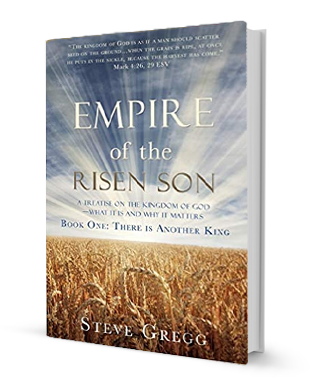 Empire of the Risen Son
Empire of the Risen Son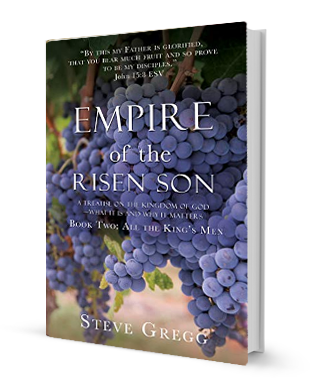 Empire of the Risen Son
Empire of the Risen Son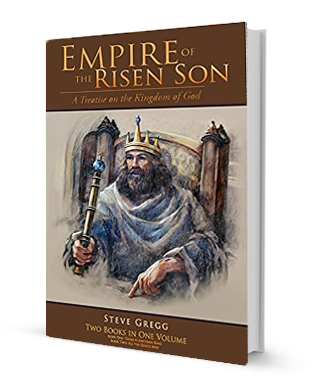 Empire of the Risen Son
Empire of the Risen Son
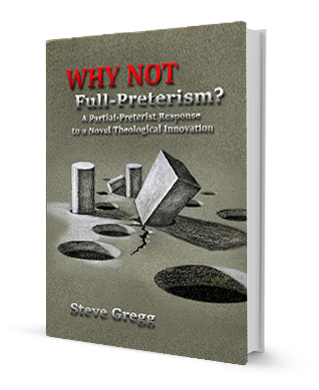 Why Not Full Preterism?
Why Not Full Preterism?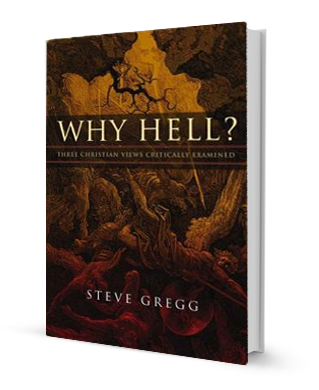 Why Hell? Three Christian Views
Why Hell? Three Christian Views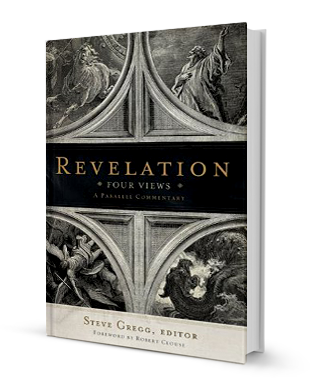 Revelation: Four Views
Revelation: Four Views















